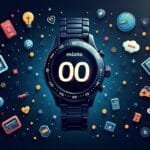“`html
Are Wearable Stress Monitors the Key to Unlocking a Calmer You? With stress levels at an all-time high, it’s no wonder people are turning to innovative solutions like stress monitoring wearables to regain control over their mental well-being. These wearable devices have become increasingly popular, and for good reason – they offer a convenient and non-intrusive way to track heart rate variability (HRV) and other vital signs that can indicate stress levels.
In this article, we’ll delve into the world of stress monitoring wearables, exploring the top heart rate and stress tracking devices on the market. From fitness trackers with built-in stress sensors to smartwatches designed specifically for mental wellness, we’ll cover it all. Whether you’re looking to reduce anxiety, improve focus, or simply feel more centered, our guide will provide valuable insights into the latest technology trends in wearable gadgets.
As wearable tech continues to advance and become an integral part of our daily lives, stress monitoring wearables are poised to play a significant role in shaping the future of mental health. By understanding how these devices work and what features to look for, you can make informed decisions about which device is right for you. So, let’s get started on this journey to discover the best stress monitoring wearables that can help you unlock a calmer, more balanced you – and stay ahead of the curve in the world of wearable gadgets and technology trends.
What is “Stress Monitoring Wearables”?
Stress monitoring wearables are devices designed to track physiological indicators of stress, such as heart rate variability, skin temperature, and electrodermal activity. These gadgets help users manage stress by providing real-time feedback and insights into their mental and physical state.
The Rise of Wearable Stress Trackers
The popularity of wearable stress trackers has surged in recent years, driven by increasing awareness of mental health and technological advancements. According to a report by Grand View Research, the global wearable technology market is expected to reach $118.16 billion by 2028, with stress monitoring devices playing a crucial role in this growth.
These devices offer several benefits, including:
- Real-time stress tracking and alerts
- Personalized insights and recommendations
- Integration with health apps for comprehensive wellness management

Top 10 Devices Revolutionizing Your Health in 2025
As we look towards 2025, several stress management devices are set to revolutionize how we monitor and manage stress. Here are the top 10 devices leading the charge:
- Apple Watch Series 8: Known for its advanced health features, the Series 8 includes a stress monitoring app that uses HRV and mindfulness prompts.
- Fitbit Sense: This device offers an EDA sensor to track stress responses and provides guided breathing sessions.
- Garmin Venu 2: With its Body Battery energy monitoring, it helps users understand their stress levels throughout the day.
- Whoop Strap 4.0: Focused on performance, it tracks recovery and stress through HRV and sleep analysis.
- Oura Ring: A discreet option that monitors stress through HRV and temperature changes.
- Samsung Galaxy Watch 5: Offers stress management tools and integrates with Samsung Health for a holistic approach.
- Polar Vantage V2: Designed for athletes, it provides insights into training stress and recovery.
- Withings ScanWatch: Combines medical-grade ECG with stress tracking features.
- Biostrap EVO: Focuses on biometric data to provide stress and recovery insights.
- Muse S: A headband that offers real-time feedback on brain activity and stress levels.
How Do Stress Monitoring Wearables Work?
Stress monitoring wearables utilize a combination of sensors and algorithms to detect physiological changes associated with stress. These devices typically measure:
- Heart Rate Variability (HRV): A key indicator of stress, HRV measures the variation in time between heartbeats.
- Electrodermal Activity (EDA): Tracks changes in skin conductance, which can indicate stress levels.
- Skin Temperature: Fluctuations in temperature can signal stress responses.
By analyzing these metrics, wearables provide users with actionable insights and personalized recommendations to manage stress effectively.
Comparing Heart Rate and Stress Monitoring Wearables
To help you choose the right device, we’ve compared some of the leading heart rate and stress monitoring wearables based on key features:
| Device | Key Features | Price Range |
|---|---|---|
| Apple Watch Series 8 | HRV, mindfulness prompts, ECG | $399 – $749 |
| Fitbit Sense | EDA sensor, guided breathing | $299 – $329 |
| Garmin Venu 2 | Body Battery, stress tracking | $399 – $449 |
| Whoop Strap 4.0 | HRV, sleep analysis | $30/month subscription |
| Oura Ring | HRV, temperature monitoring | $299 – $399 |
Benefits of Using Stress Management Devices
Incorporating stress management devices into your daily routine can offer numerous benefits:
- Improved Mental Health: By providing real-time feedback, these devices help users identify stressors and adopt healthier coping strategies.
- Enhanced Physical Health: Monitoring stress can lead to better sleep, reduced anxiety, and improved cardiovascular health.
- Increased Productivity: Understanding stress patterns can help users optimize their work-life balance and boost productivity.
Challenges and Considerations
While anxiety monitoring gadgets offer many advantages, there are also challenges to consider:
- Data Privacy: Users must ensure their data is protected and used responsibly by manufacturers.
- Accuracy: Not all devices offer the same level of accuracy, so it’s important to research and choose a reliable product.
- Cost: High-quality devices can be expensive, so budget considerations are essential.
Future Trends in Wearable Gadgets and Technology
The future of wearable gadgets and technology trends is promising, with several exciting developments on the horizon:
- AI Integration: Advanced algorithms will provide even more personalized insights and recommendations.
- Improved Battery Life: Longer-lasting batteries will enhance the user experience and convenience.
- Expanded Health Metrics: Future devices may include additional sensors for comprehensive health monitoring.
Conclusion: Embrace the Future of Stress Monitoring Wearables
As we move towards a more health-conscious future, stress monitoring wearables will play a pivotal role in helping individuals manage their mental and physical well-being. By choosing the right device, you can take control of your stress levels and lead a healthier, more balanced life. For more information on heart rate and stress monitoring wearables, visit Wearable Gear Trends.
Additional Resources
Stay informed and ahead of the curve by following us at Wearable Gear Trends. Subscribe to our newsletter for the latest updates on heart rate and stress monitoring wearables.
“`





